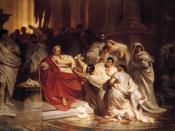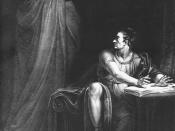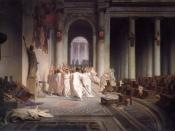In the play, Julius Caesar, by William Shakespeare, the interaction of characters help reveal the themes promoted by the playwright. This is especially true in Act Three, Scene Two. The ability of powerful oratory is demonstrated. Another issue in this scene is corruption from power. Loyalty and the lack thereof, is illustracted as the crowd is shown to be fickle.
Persuasive verbalism has the potential to alter the thoughts of the public. Both Brutus and Antony turn the tide of the Romans to their side. To exemplify, Brutus remarks, " Not that I loved Caesar less, but that I loved Rome more" (Act 3 Scene 2). Thus, Brutus convinces the audience that the assassination of Caesar is for the good of Rome, and not because of personal dislike. Additionally, Brutus states, "Who here would be so base a bondman? If any, speak; for him I have offended" (Act 3 Scene 2).
Consequently, Brutus is able to create an effect that only lower classes would be offended by the actions of the conspirators. In like manner, Antony sways an antagonistic group to his side. For instance, Antony mentions, "For Brutus is an honourable man; so they are all, honourable men" (Act 3 Scene 2). Hence, Antony points out to the crowd that it is ironic that the only evidence Brutus has is that the only evidence Brutus has is that the conspirators are only honourable men. Also Antony reminds the audience, "When the poor have cried, Caesar hath wept; ambition should be made of sterner stuff" (Act 3 Scene 2). As a result, Antony continues his persuasion by disproving Brutus' main reason for the murder of Caesar.
Authenticity can be a catalyst for depravity. Brutus remarks, "But as he was ambitious, I slew him" (Act 3 Scene 2). Hence,


